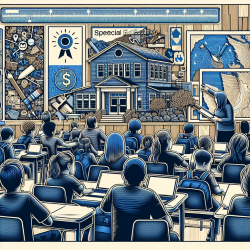Introduction
In the wake of natural disasters, the psychological well-being of adolescents is often severely impacted. A recent study titled "Relationship between salivary cortisol and depression in adolescent survivors of a major natural disaster" provides valuable insights into the potential use of salivary cortisol as a biomarker for depression in this vulnerable population. This blog aims to help practitioners improve their skills by implementing the outcomes of this research and encourages further exploration into this promising area.
Understanding the Research
The study focused on adolescent survivors of the 2011 Tohoku Earthquake in Japan. Researchers examined the relationship between salivary cortisol levels and depression using the General Health Questionnaire (GHQ). The study involved 63 adolescents who provided saliva samples thrice daily over three days. The findings revealed that salivary cortisol levels, particularly the morning/evening ratio, could effectively discriminate between adolescents with and without depressive symptoms.
Practical Applications for Practitioners
For practitioners working with adolescents affected by natural disasters, incorporating salivary cortisol measurements into mental health screenings could offer a non-invasive, objective method to identify those at risk of depression. Here are some practical steps practitioners can take:
- Implement Salivary Cortisol Testing: Consider integrating salivary cortisol testing into routine screenings for adolescents in disaster-affected areas. This approach can help identify those who may benefit from early intervention.
- Focus on Timing and Frequency: The study suggests that measuring salivary cortisol levels twice a day (morning and evening) over three consecutive days provides the most reliable results. Practitioners should adhere to this protocol for optimal outcomes.
- Collaborate with Schools and Communities: Partner with schools and community organizations to facilitate saliva sample collection and ensure that adolescents have access to mental health resources.
Encouraging Further Research
While the study provides promising insights, further research is needed to refine the use of salivary cortisol as a screening tool for depression. Practitioners are encouraged to collaborate with researchers to explore the following areas:
- Expand Sample Sizes: Conduct studies with larger and more diverse populations to validate the findings and ensure generalizability across different cultural contexts.
- Investigate Long-Term Effects: Examine the long-term relationship between salivary cortisol levels and mental health outcomes to understand the potential for early intervention.
- Explore Additional Biomarkers: Consider investigating other biomarkers that could complement salivary cortisol measurements and enhance the accuracy of depression screenings.
Conclusion
The research on salivary cortisol and depression in adolescent survivors of natural disasters offers valuable insights for practitioners seeking to improve mental health outcomes. By incorporating these findings into practice and encouraging further research, we can better support the psychological well-being of young survivors. To read the original research paper, please follow this link: Relationship between salivary cortisol and depression in adolescent survivors of a major natural disaster.










